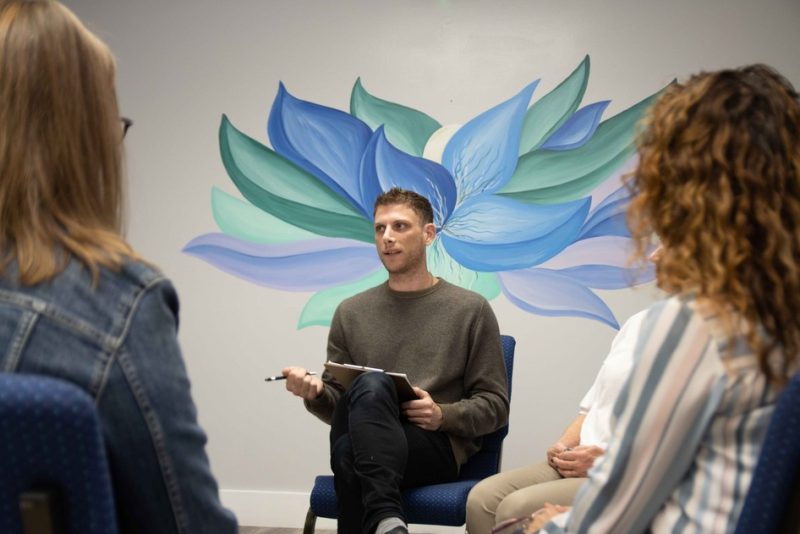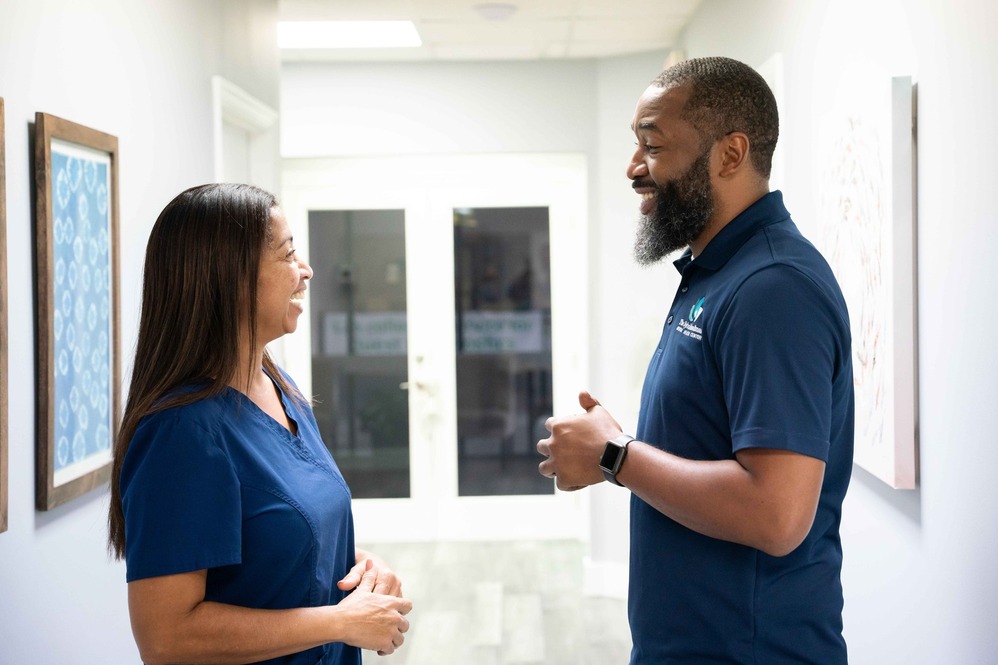The Sylvia Brafman Mental Health Center is a highly respected behavioral health intensive treatment center. We specialize in providing comprehensive treatment for adults who are struggling with managing a variety of issues, including mental health and coexisting substance use disorders. Read on to learn how to pay for an intensive outpatient program in Georgia, and contact us if you have any questions or concerns or if you simply need support. Through our structured mental health programs, we can help you get started on your path to emotional wellness.

How to Pay For an Intensive Outpatient Program (IOP) for Mental Health Near Atlanta, Georgia
What Are Intensive Outpatient (IOPs) Programs for Mental Health Therapy and Treatment?
Intensive Outpatient Programs (IOPs) are a form of behavioral health intensive treatment that provides supportive outpatient care. IOPs offer structured support at a less intensive level than inpatient or partial hospitalization programs. An IOP is often used as a form of transitionary care when moving from a more intensive program structure.
An IOP will usually meet for several hours per day, a few times per week. The duration of the program varies based on the facility and your needs but can range from several weeks to months. The details of the program will largely depend on your unique needs and the goals you set with your care team.
The advantage of an IOP is that you can receive treatment in the form of individual and group therapy and still return to your daily routines and commitments once you have completed your work for the day. The goal of these outpatient mental health rehabilitation programs is to implement tools and skills to manage your symptoms effectively. This ensures that you have the support and resources available to improve your overall mental health, even after completing treatment.

What Are the Main Differences Between IOP and PHP Treatment Programs Around Georgia?
IOPs and PHPs are both forms of outpatient mental health services. Both require less commitment than inpatient therapy but more commitment than traditional outpatient therapy sessions. PHPs are focused primarily on stabilization, while IOPs emphasize building skills and creating a supportive environment to grow and develop.
An IOP will require you to attend treatment for three to five days per week for a few hours at a time. IOPs will range in how long they last, but it could be a few weeks to several months. PHPs involve more intensive psychiatric outpatient care and require you to go to treatment sessions five to seven days a week for large chunks of the day. PHPs are more short-term than IOPs.
If you are looking for partial hospitalization alternatives, an IOP may be for you. You can spend a portion of your day in treatment and return to your home and outside obligations at the end of each session. IOPs also offer more flexibility than the intensive outpatient behavioral therapy found in a PHP. You can do daytime mental health treatment or evening outpatient counseling, depending on your needs and schedule.
What Are the Goals of a Georgia Mental Health IOP Program?
The goal of intensive therapy programs in an outpatient setting is to help implement tools and resources post-stabilization. This is why IOPs often act as a step down from a more intensive form of treatment, such as residential programs or PHPs. An IOP will support your continued recovery while offering flexibility.
In an IOP, you will work with a mental health professional in individual therapy sessions, as well as have the opportunity to attend group sessions and receive aftercare support services. The point of an IOP is to help you acclimate the things you have learned in treatment into your daily life and habits. This work will help you ultimately improve your life and well-being.
Who Are Intensive Outpatient Programs Designed For?
Intensive Outpatient Programs (IOPs) are ideal if you’re transitioning from inpatient care, providing ongoing support as you adjust to life outside a treatment facility. They’re also suitable if you need more intensive therapy than weekly sessions can provide. They work best if you have a stable, supportive home environment and allow you to maintain daily activities while receiving structured treatment.
An IOP is not for you if you require a consistent level of care or are in crisis. IOPs provide comprehensive outpatient services while still allowing you the flexibility to attend to obligations in your life. If this sounds like an IOP could be for you, a great way to get started is by taking advantage of our free mental health assessment. This evaluation will help us to determine the best ways to meet your treatment needs.

Statistics on Mental Health Private Pay Intensive Outpatient Programs in Georgia
Intensive Outpatient Programs (IOPs) have proven effective in treating a range of issues and are just as effective as spending time in a residential treatment center full-time. The amount of time spent in an IOP varies based on patient needs, but one study found the average to be 42 days.
Intensive outpatient behavioral facilities often specialize in what they treat. For example, in 2019, 46% of outpatient facilities specifically provided care for individuals who were dealing with co-existing mental health and substance use disorders. There are approximately 135 IOPs in Georgia that offer dual diagnosis outpatient programs. Additionally, as Georgia’s older population continues to age, the need for outpatient care in the state is projected to increase.

Private Intensive Outpatient Programs for Mental Health That Offer Flexible Payment Plans Near Me
If you are considering beginning intensive outpatient treatment, one of the first concerns you may be weighing is how to pay for a mental health IOP. Fortunately, there are affordable ways to cover rehab costs. Most mental health facilities prioritize you receiving the care you need and are happy to work with you to find a financial solution.
If how to pay for intensive outpatient treatment centers in Georgia is at the top of your mind, know that The Sylvia Brafman Mental Health Center is here to discuss your options with you. We offer flexible rehab payment plans and also have resources available to ensure you get the support you need. Come visit us at 7710 NW 71st Ct, Tamarac, FL 33321, or call us at 877-958-9212.

Does Private Health Insurance Pay For Mental Health Disorder Intensive Outpatient Programs Around Georgia?
When exploring how to pay for an intensive outpatient mental health program in Georgia, insurance coverage is likely the first thing you consider. Health insurance providers do offer some mental health coverage, but the level of coverage will depend on a few components, including the program and your policy specifics.
Some policies may offer wider coverage for IOP treatment, and others may be more limited in the support that they offer. The only way to know for sure what will be covered is to know all of the details of your insurance policy. You can reach out to your insurance provider’s directory, or we are happy to help you verify your insurance.
How To Get Health Insurance To Pay For Mental Health IOPs Near Me
Before beginning treatment, you may have to consider how to get insurance to pay for IOP treatment. The best thing you can do to make sure your insurance covers your treatment is to be proactive and understand all of the details of your policy, including deductibles, copays, and any required prior authorizations.
It is also important to keep all paperwork related to your care costs, coverage, and contact with your insurance provider. If you know that you are covered and your insurance company is resistant to paying the claim, be prepared to appeal the decision with all of the paperwork you have maintained.
At The Sylvia Brafman Mental Health Treatment Center in Fort Lauderdale, Florida, our team of dedicated professionals is ready to guide you. We offer IOP and a variety anxiety treatment programs, each uniquely designed to meet your needs. We’re also able to offer accommodation at affordable rates if you’re traveling from out of state. So don’t wait—reach out to us today! Either give us a call or fill out the form below to request a callback.
"*" indicates required fields

Ways To Pay For Mental Health IOPs Without Health Insurance Coverage
If you are reading this page, you are likely wondering how to pay for an intensive outpatient mental health program in Georgia. Whether you are struggling with mental health or substance use disorder, know that there are ways to get help paying for mental health and drug rehab without insurance.
Here are some creative methods we have come up with for how to pay for an intensive outpatient program in Georgia:

How Much Does a Mental Health IOP Cost Without Health Insurance Coverage?
IOPs cost less than a PHP or residential program but more than outpatient therapy. The structure of an IOP requires you to attend treatment sessions for three to five days a week, for several hours per day. Costs vary, but if you are paying for rehab without insurance, you can expect to pay somewhere between $200 to $800 per session.
Without insurance coverage, you will be responsible for paying the full cost of your IOP treatment. However, do not be disheartened by these cost estimates. There are ways to find alternative financing for rehab, such as state-funded rehab in Georgia or scholarships for rehab programs.
How to Lower the Cost of Mental Health IOP Treatment
Finances should not be a barrier to receiving the healthcare you deserve. Many mental health providers believe this, and that is why alternative financing options are becoming more readily available. To find Georgia rehab assistance programs and substance abuse recovery on a budget, explore the treatment locator tool on the SAMHSA website.
We are also happy to walk you through your options. Call one of our patient advocates today at 877-958-9212. We can help you determine your treatment needs and help you find resources to find the care you deserve at an affordable price.
How To Get Into an IOP for Mental Health Near Georgia
If you have decided that an Intensive Outpatient Program is the solution for you and your mental health needs, you may be wondering what the next steps are. While the admissions process can vary from facility to facility, you can expect some variation in the following steps.



